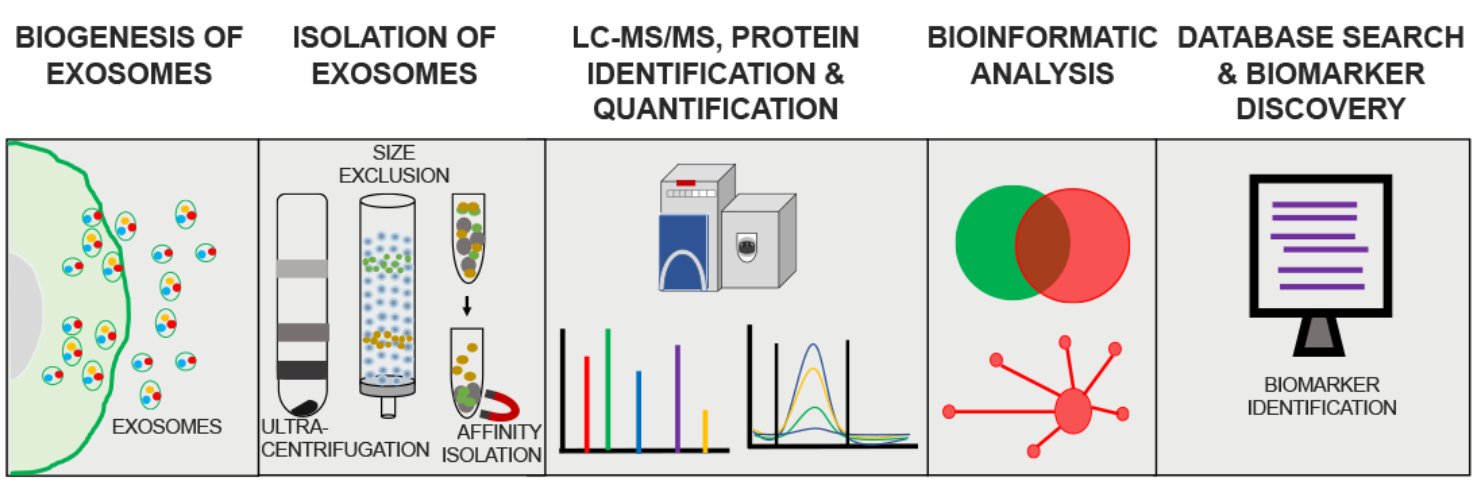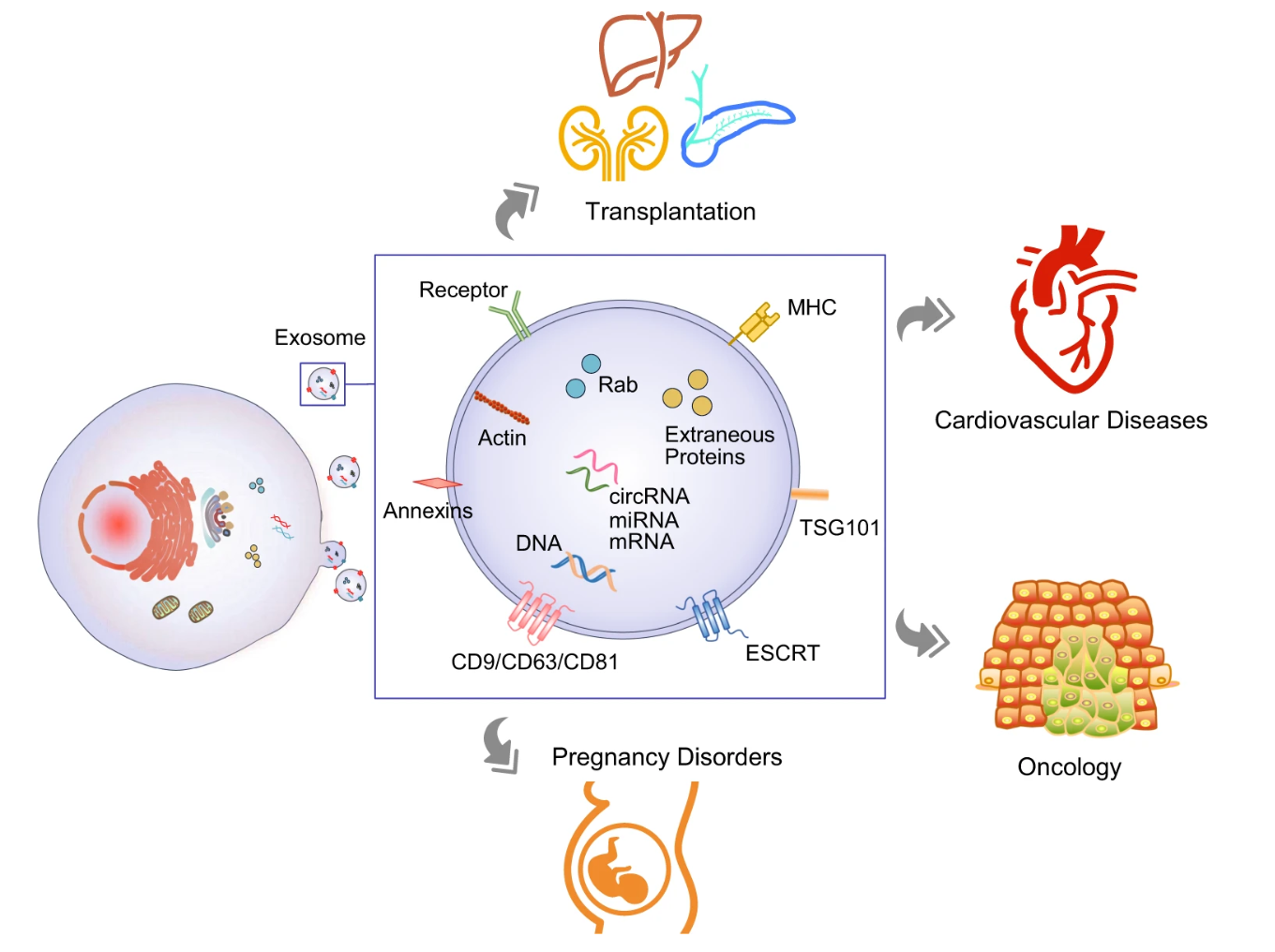Diagnostic Applications of Exosomes
- Cancer (e.g., lung, breast, prostate, ovarian, colorectal)
- Neurological diseases (e.g., Alzheimer's disease, Parkinson's disease)
- Cardiovascular diseases (e.g., myocardial infarction, heart failure)
- Infectious diseases (e.g., HIV, COVID-19, toxoplasmosis)
- Autoimmune diseases (e.g., rheumatoid arthritis, lupus)
- Liver diseases (e.g., hepatitis, cirrhosis)
- Kidney diseases (e.g., chronic kidney disease, acute kidney injury)
- Lung disease(e.g., Pneumonia)
- Diabetes and metabolic disorders
- Inflammatory diseases (e.g., Crohn's disease, ulcerative colitis)
- Pregnancy complications (e.g., preeclampsia, gestational diabetes)
Exosomes are critical players in cell-to-cell communication. Derived from various biological fluids such as blood, urine, saliva, and cerebrospinal fluid, exosomes carry a diverse cargo of proteins, lipids, and nucleic acids that reflect the physiological and pathological state of their originating cells. Due to their stability, specificity, and accessibility, exosomes serve as ideal biomarkers for disease diagnostics, providing a non-invasive alternative to traditional biopsy-based methods. MtoZ Biolabs offers comprehensive services for biomarker discovery and research, supporting the development of Diagnostic Applications of Exosomes to enhance disease detection and monitoring.
Advantages of Exosome-Based Diagnostics
1️⃣Diverse Sample Sources
Exosomes can be isolated from a wide range of biological fluids, including blood, urine, saliva, cerebrospinal fluid, and breast milk, making them highly accessible for diagnostic applications across various diseases.
2️⃣Stable and Protected Biomarkers
Encapsulation within the lipid bilayer protects exosomal cargo, such as proteins, lipids, and nucleic acids, from enzymatic degradation, ensuring the stability and reliability of biomarkers for disease detection.
3️⃣Non-Invasive Sample Collection
Unlike traditional tissue biopsies, exosome-based diagnostics utilize liquid biopsy techniques, enabling the collection of biological fluids with minimal patient discomfort while reducing the risk of complications.
4️⃣Real-Time Disease Monitoring
Exosomes continuously circulate in bodily fluids, reflecting dynamic changes in cellular states. This allows for real-time monitoring of disease progression, treatment response, and minimal residual disease detection.
5️⃣Comprehensive Molecular Insights
Exosomes carry a complex array of bioactive molecules, including mRNA, miRNA, and proteins, providing multidimensional biological information that aids in early diagnosis, patient stratification, and precision medicine.
Service at MtoZ Biolabs
MtoZ Biolabs specializes in the isolation, characterization, and analysis of exosomes, tailored to enhance the diagnostic capabilities of exosomes for disease detection and monitoring.
1. Exosome Isolation and Purification
MtoZ Biolabs uses a combination of ultracentrifugation, size-exclusion chromatography (SEC), immunoaffinity capture, and filtration-based methods to efficiently isolate exosomes from various biological fluids, such as blood, urine, and cerebrospinal fluid. These methods ensure high yield, purity, and reproducibility, addressing the challenge of isolating exosomes from complex sample matrices.
2. Exosome Characterization
We use multiple advanced technologies to characterize isolated exosomes, ensuring comprehensive and accurate analysis. These include Transmission Electron Microscopy (TEM) for morphology assessment, Nano-Tracking Analysis (NTA) for size distribution, and Western blotting or mass spectrometry for surface marker identification. These methods allow for high-quality validation of exosome purity and integrity, critical for downstream diagnostic applications.
3. Exosome Content Extraction and Analysis
MtoZ Biolabs has established an advanced exosome content extraction and analysis platform, providing critical insights for disease diagnostics and biomarker discovery. High-resolution LC-MS/MS enables precise proteomic profiling, identifying disease-specific protein signatures. Lipidomics analysis reveals exosomal lipid composition. RNA sequencing (RNA-Seq) deciphers exosomal RNA profiles, including mRNA and miRNA, for disease classification and prognosis. Additionally, metabolomics profiling detects metabolic alterations linked to pathological conditions. By integrating these high-throughput approaches, MtoZ Biolabs delivers comprehensive exosome content analysis, supporting non-invasive diagnostics applications of exosomes

Mathew, B. et al. Brain Sci. 2021.
Figure 1. Workflow for Identifying and Validating Protein Biomarkers in Exosomes for Neurological Disorders
Service Advantages
The Diagnostic Applications of Exosomes service at MtoZ Biolabs offers several key advantages:
☑️Advanced Platforms: Utilizes state-of-the-art technologies for efficient exosome isolation, characterization, and analysis.
☑️Experienced Expert Team: Our team of skilled professionals ensures high-quality service and accurate results.
☑️Wide Application Range: Applicable to a diverse range of diseases, from cancer to neurological and cardiovascular conditions.
☑️Customized Solutions: Tailored services to meet the specific diagnostic and research needs of our clients, ensuring precise and reliable outcomes.
Applications
Exosomes can be used for diagnostic applications in various diseases, including but not limited to:

Zhou, B. et al. Signal Transduct Target Ther. 2020.
Figure 2. Application of Exosomes as Liquid Biopsy
FAQ
Q1: What challenges do you face in isolating high-quality exosomes from various biological fluids?
Isolating high-quality exosomes is challenging due to their small size, heterogeneity, and the complexity of biological samples. MtoZ Biolabs addresses this with optimized ultracentrifugation, immunoaffinity capture, and SEC, ensuring high purity and yield through advanced isolation and characterization techniques.
Q2: How do exosome-based diagnostics contribute to personalized medicine?
Exosome-based diagnostics enable personalized medicine by providing real-time, non-invasive monitoring of disease biomarkers, enabling tailored treatment plans and improving therapeutic outcomes. They offer insights into tumor progression, treatment response, and drug efficacy by analyzing exosomal content such as proteins and nucleic acids.
MtoZ Biolabs provides comprehensive solutions for researchers, clinicians, and pharmaceutical companies, accelerating the development of exosome-based diagnostic assays. Contact us to explore how our exosome-based diagnostic services can enhance your research and clinical applications.
How to order?







